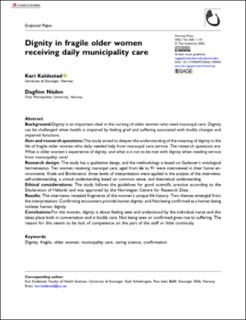| dc.contributor.author | Kaldestad, Kari | |
| dc.contributor.author | Nåden, Dagfinn | |
| dc.date.accessioned | 2022-10-03T07:28:57Z | |
| dc.date.available | 2022-10-03T07:28:57Z | |
| dc.date.created | 2022-09-01T11:06:05Z | |
| dc.date.issued | 2022-06-28 | |
| dc.identifier.citation | Nursing Ethics. 2022, 0(0) 1-10. | en_US |
| dc.identifier.issn | 0969-7330 | |
| dc.identifier.issn | 1477-0989 | |
| dc.identifier.uri | https://hdl.handle.net/11250/3023182 | |
| dc.description.abstract | Background:Dignity is an important ideal in the nursing of older women who need municipal care. Dignity can be challenged when health is impaired by feeling grief and suffering associated with bodily changes and impaired functions.
Aim and research questions:The study aimed to deepen the understanding of the meaning of dignity in the life of fragile older women who daily needed help from municipal care service. The research questions are: What is older women’s experience of dignity, and what is it not to be met with dignity when needing service from municipality care?
Research design: The study has a qualitative design, and the methodology is based on Gadamer’s ontological hermeneutics. Ten women receiving municipal care, aged from 66 to 91 were interviewed in their home environments. Kvale and Brinkmanns’ three levels of interpretation were applied in the analysis of the interviews: self-understanding, a critical understanding based on common sense, and theoretical understanding.
Ethical considerations: The study follows the guidelines for good scientific practice according to the Declaration of Helsinki and was approved by the Norwegian Centre for Research Data.
Results: The interviews revealed fragments of the women’s unique life history. Two themes emerged from the interpretation: Confirming encounters provide human dignity; and Not being confirmed as a human being violates human dignity.
Conclusions:For the women, dignity is about feeling seen and understood by the individual nurse and this takes place both in conversation and in bodily care. Not being seen or confirmed gives rise to suffering. The reason for this seems to be lack of competence on the part of the staff or little continuity. | en_US |
| dc.language.iso | eng | en_US |
| dc.publisher | SAGE Publications | en_US |
| dc.relation.ispartofseries | Nursing Ethics; | |
| dc.rights | Navngivelse-Ikkekommersiell 4.0 Internasjonal | * |
| dc.rights.uri | http://creativecommons.org/licenses/by-nc/4.0/deed.no | * |
| dc.subject | Dignity | en_US |
| dc.subject | Fragility | en_US |
| dc.subject | Older women | en_US |
| dc.subject | Municipality care | en_US |
| dc.subject | Caring science | en_US |
| dc.subject | Confirmation | en_US |
| dc.title | Dignity in fragile older women receiving daily municipality care | en_US |
| dc.type | Peer reviewed | en_US |
| dc.type | Journal article | en_US |
| dc.description.version | publishedVersion | en_US |
| dc.rights.holder | © The Author(s) 2022 | en_US |
| cristin.ispublished | true | |
| cristin.fulltext | original | |
| cristin.qualitycode | 2 | |
| dc.identifier.doi | https://doi.org/10.1177/09697330221109942 | |
| dc.identifier.cristin | 2047820 | |
| dc.source.journal | Nursing Ethics | en_US |
| dc.source.pagenumber | 1-10 | en_US |

